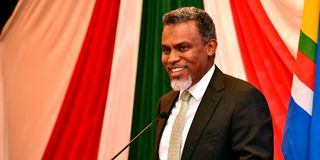Premium
In Haji, we have the spymaster

DPP Noordin Haji who has been nominated for National Intelligence Service director-general job.
When I heard that the President had appointed Director of Public Prosecutions Noordin Haji as the country’s spymaster, the thought that popped into my mind is: Oh, he just got himself a second term.
Recent spy bosses have come from the military and their instincts are more security-, rather than politically, oriented. Mr Haji is first of the spymasters in the civilian mould, only the third after James Kanyotu and William Kivuvani. He has politics in his veins as the grandson of a senator and son of a long-serving MP and Cabinet minister.
I have poked this large, flat Bantu nose of mine in many places in pursuit of the Holy Grail of journalism—The story. I have seen many things, and learnt many truths, some of which I will take to the grave, and I can make one statement with absolute certainty: People do not become Directors-General of the National Intelligence Service (NIS) through luck, incompetence or nepotism. Never. A little bit of tribalism might help here and there, but that’s all.
Whenever an appointment is made, folks who have never met the appointee will loudly proclaim that he or she does not qualify for the position, is not up to the task and should be removed instantly.
We did that once and I had to present myself to a military person who conducted part of the interview with his face, swollen with fury and veins standing out, almost smashed against mine, his chapati-dowel finger wagging a centimetre away from my eye.
We had insulted his wife—and him—by reporting that he had been promoted because his wife was his bosses’ s sister. I remained calm and polite but confused. If your wife can’t get you a promotion from her brother, what are wives for?
People said the same thing about another man who came to meet us in the middle of the Exchange Bar at the Sarova Stanley in down downtown Nairobi, encased in subtle but very effective disguise, down to mismatched cheap socks.
He had a nose like the beak of a bird of prey and the watchful eyes of a hawk which never changed even when he laughed or smiled—hard laser probes. And if you made certain moves, like touching your pockets or scratching your neck, his pupils dilated and eyes narrowed. It wasn’t difficult to get in real trouble in some of these assignments.
A very good spy
Mr Haji has the reputation of a very good spy. I remember seeing him many years ago, a light-skinned guy with curly hair and a big smile, at the lifts of I&M Building, where, my colleagues told me, the spooks had a nest a floor below us and had drilled through their ceiling and tapped into our systems. This may well have been a newsroom jaba story (there are many of those).
There was a travel agency down there, although I never quite remember seeing anyone going to book tickets. I wanted to raise hell but a source, a big government bureaucrat then, calmed me down. They are everywhere, he said, and they just want to know what you are doing, nobody is stopping you from doing anything.
By all accounts, Mr Haji is an experienced, hardworking and committed guy who has waged war against terrorists and drug dealers and has good diplomatic skills to deal with foreign governments as well—something some senior civil servants and politicians struggle with.
And given the number of journalists who list him among their very best friends the last time I checked, he must have done a stint in media and corporate intelligence and deeply penetrated our ranks. Old skins like John Kamau and I know that spies, like reporters, have no friends. Just briefs and sources.
I would imagine that Mr Haji is more of a Kenyan than a Somali. This is not to say that that is not his tribe; it is. He did not grow up in El Wak; he most probably went to school all over the place and was raised all over the country. He has a complex, integrated background with relatives from many tribes. This is not exactly like some of us who were born and brought up in Mwanika Village, went to Mwanika Full Primary, and attended Mwanika Day and the Mt Kenya University campus at the local shopping centre.
In that case, ethnicity is not a matter of merely identifying with a tribe but also a deep socialisation, world view and value system because we haven’t been exposed to anything else. He should be the last to be victimised because people think that some tribes should not get certain jobs.
Kenya is, from a security position, relatively more stable than it has been for a while. Our biggest problems are in politics, our democracy is unstable, corruption is threatening to bring our country down. We have an opportunity to strengthen multi-party democracy and mount a serious fight, yet again, against graft. What we have is a political and civilian malaise, not a military or security one.
Mr Haji is the man for the job.





